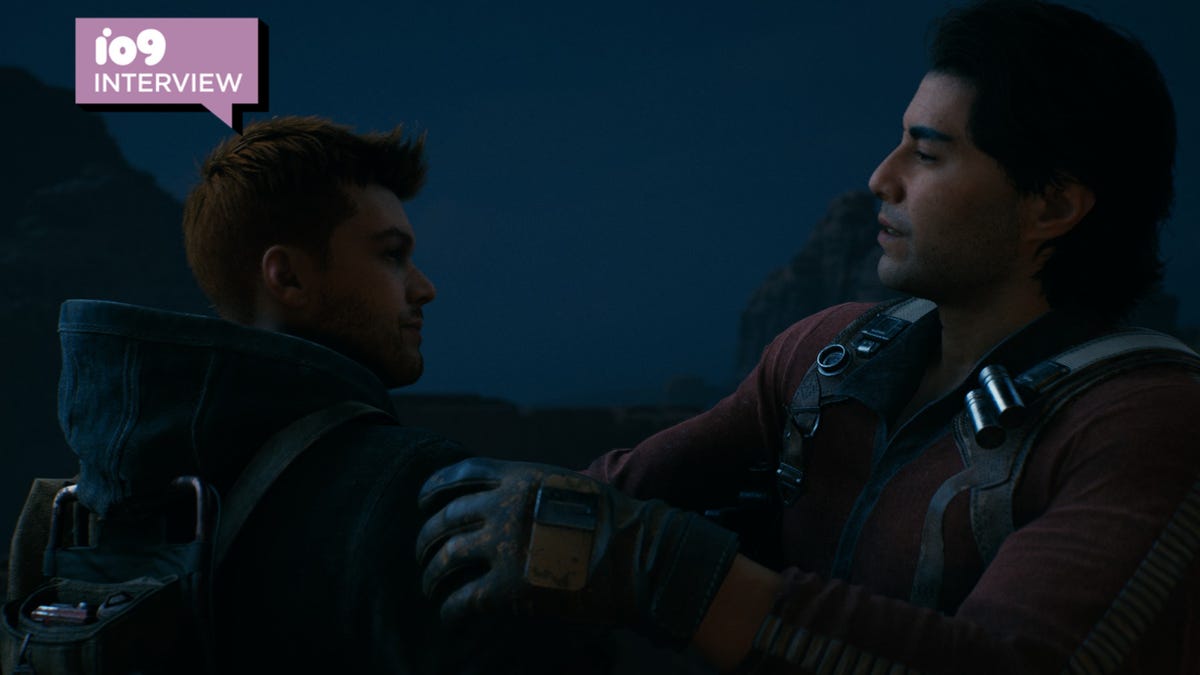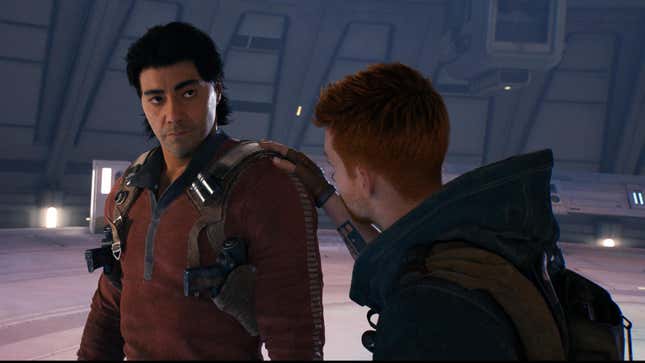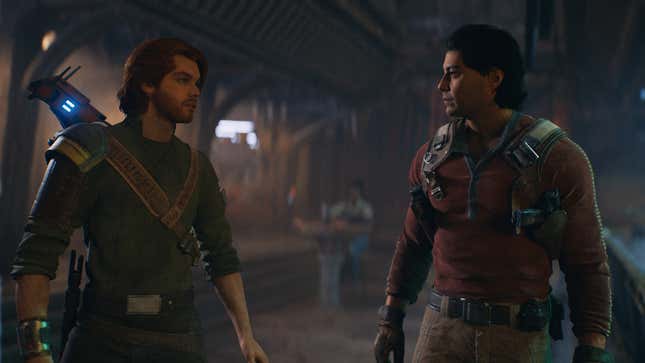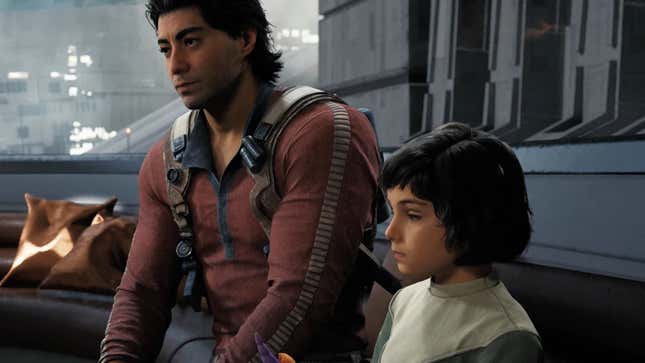
Respawn’s Star Wars Jedi games are firmly embedded in the years before the original trilogy, and keep the focus on a core cast of wholly new heroes and villains. It’s what made Star Wars Jedi: Survivor from earlier this year so excellent: the games take advantage of that relative freedom from the timeline and offer up an interesting array of original characters for audiences to love.
One of the newest additions for the sequel was Bode Akuna, a mercenary who shows up early in Survivor and becomes one of Cal Kestis’ key allies. For much of the game, he’s got a fun rapport with Cal and is more than handy in a fight. He’s the kind of guy Star Wars tends to have: a charming dude who fits into the Mantis crew fairly well and serves as another reliable heavy hitter.
But not all friends are friendly in Star Wars. It’s eventually revealed Bode is both an Order 66 survivor like Cal, and also a double agent for the ISB. From there, the rest of the game becomes about Cal hunting down his former friend and letting himself dip into the Dark Side, as Jedi often do.
Recently, io9 spoke with Respawn writers Cole Swany and Danny Homan to break down Bode’s conception, his heel turn, and how he serves as a mirror to Cal.
Justin Carter, io9: Cal and Bode’s relationship is really built up in Survivor’s first half, to the point where Bode “unlocks” Cal’s Blaster Stance. Did you ever worry you were laying things on a little too thick?
Cole Swany, writer: Our two goals were making sure it’s not too conspicuous, while also making sure it makes sense once you figure it out. One of the tools the narrative team used to help with that were the post-game Force echoes, where you get to understand Bode’s thought process every step of the way. As a player, you start to piece together his motivations, and for us, we get to tell the story more piecewise.
Danny Homan, lead writer: When we were developing Bode as a character, we looked at the type of person Cal needed in his life, but would also cause some of the greatest self-reflection and conflict within him. The idea of a Jedi working for the ISB and tracking Cere provided a really juicy starting point for a dramatic contrast between Cal and Bode, and how their lives differed after the Clone Wars.
The great unknown in writing is toeing a line and trying to not tip the scales too much. Some people are just suspicious of newcomers right away, some saw Bode’s dreamy eyes and went, “This guy would never betray me!” I think from talking to a lot of players, we’re proud with how the portrayal landed. At the end of the day, it’s a fun story point, but what we really care about is Cal’s perspective and his feelings on the betrayal. So long as Cal feels that, then we feel like we’re succeeding.

io9: The shared reveal of Bode as a traitor and a Jedi work really well. Had you thought about potentially spacing them out and having one reveal before the other?
Homan: Now that the game’s been out and players have had time to digest that turn, it’s been fun to watch people’s reactions. Some say they saw the betrayal coming, but not him being a Jedi, or it was the other way around. Those two moments so close together work really well because they set you off-kilter as an audience, so to me, they were always meant to be in tandem.
One of the challenging things about writing a betrayal like this is making sure players don’t see it coming, while also providing enough clues to point towards it in hindsight. There’s dialogue on Jedha where Greez mentions the Path and tells Bode to keep it to himself; since Greez is a comedic character, you may not take him completely seriously versus Merrin saying it. We worked to provide a breadcrumb trail, so the one-two punch of “betrayal, then Jedi” works because even if you saw one coming, you might not have predicted the other.
Swany: A crucial way Bode challenges and pushes on Cal is with his daughter, Kata. During production, our narrative director Aaron Contreras described one of Cal’s wildest fantasies as being able to run away with Merrin to live an ordinary life. While the Jedi component of the reveal is a huge part of things, we didn’t want it to overshadow the fact that Cal saw something relatable in Bode as a father. Even setting aside their shared past with the Jedi Order, that was a huge part of why they bonded.
io9: It sounds like you had a pretty strong concept of Bode during development. How much did [Bode’s actor] Noshir Dalal bring to the character?
Homan: Our performance capture would feature all the actors, and they’d talk to each other or us on set. They’re all digging into their characters or talking through their own ideas. It’s a great organic process, and as a writer, Noshir is the kind of actor that you just dream of working with.
He cares so intently about Bode, and came to the role with such intensity that he needs to feel every line as the character. On set, he was always pulling us aside to ask questions about the script, word choice, and line delivery. It’s always a collaborative effort between writers and actors, but I think it’s fair to say that with Noshir, he went above and beyond because he really wants to feel [a character] before he delivers it.

io9: At what point did you decide Survivor would end with Cal having to kill Bode and Kata joining the Mantis crew?
Homan: There’s that moment where Cal confronts Bode in the ISB base and calls him a monster, to which Bode says: “I’m a father.” He was a double agent, yeah, but his affection for Cal is genuine. He’s just also a family man first. On the writing side, we really do come to believe they’re brothers-in-arms, and under different circumstances, things might’ve turned out differently.
Bode’s a genuinely good person, but the circumstances of his life led him to the Dark Side. Once you go down that path, finding clarity can be so difficult to pull yourself back from that. We want that happy ending when we look at him, but to land this story, we always felt like that sacrifice in Cal’s decision had to be really painful for him. In this case, that meant ending the life of someone he once called “brother.” One of the things we explore in Survivor is Cal briefly floating with the Dark Side and Merrin having to pull him back. Part of the themes that we’re playing with is how the people that surround you—your family, your friends—can be your greatest support mechanisms or send you down dark paths themselves.
io9: You have Cal embrace the darkness twice, both times because of Bode. Those moments really show how much that betrayal affected him.
Homan: Exactly. In the first instance, Cal meets Kata for the first time at the ISB base. He’s still going through the pain of losing Cere and Cordova, and what unsettles him is being forced to see Bode’s betrayal as a human interaction. No matter how monstrous that is, I think there’s an aspect of Cal that understands that. Like Bode, he thought fighting the Empire was hopeless, and he’s been lost without his friends and family. He’s had the crisis of conscience before, so he’s able to step into Bode’s shoes and find something kind of right in what’s being said.
Swany: Having Kata involved in the mix adds an extra layer of messiness and a more human factor, like Danny said. We have this philosophical battle of Cal grappling with the Jedi code of selflessness and protecting everyone versus Bode protecting those closest to him, and Kata deeply complicates Cal’s relationship to that betrayal. It’s more human than how normal people view things, and I think Cal’s forced to grapple with that immediately as he has those dark snaps.
When he makes the unfortunate decision to end Bode’s life, it’s as Bode is Force choking Merrin in front of him. That feels to Cal like a sign from the galaxy that he could lose his loved ones. Our hope was that these layered moments would feel like an exposed nerve where Cal had to deal with these emotions that are close to the heart.

io9: So much of Bode’s character and the game’s plot is about his daughter Kata, in some way. What went into developing her, specifically?
Homan: Because Kata’s introduced so late in the game, and because she’s gone through so much, we wanted to give players their appropriate time with her. After we shot those main cutscenes, we spent time figuring out how to broaden her character and how to give Cal and the Mantis crew more time to interact with her.
In the post-game, you can interact with her on the Mantis or on landing zones; if you take her to the cantina, you’ll see her take up gardening with Pili. One of the things we’re most proud of is how we handled Cal and Kata. The reaction from players showed us that even with her short amount of time, she feels like a complete character and someone going through a range of emotions and struggling to understand what’s happening. It’s a challenging thing for any writer, especially with a child.
Swany: Children are always tricky in stories. They usually represent innocence and hope, but Kata’s life has been defined by this incredible darkness from her father and her secret life. Our narrative director Aaron once said Star Wars has a legacy of people being mentored by their father’s killer, and the darkness that comes from that. But we also get to see the hopeful angle, where she’s building relationships with the people around her. She’s got this tremendous resilience beyond her years, and we’ve been really happy to see that resonate with players.
Homan: For me, Clementine from Telltale’s The Walking Dead ended up being a big influence on Kata. With Clem, she grows up real fast, and you see that growth play out across that series. Like Clem, Kata has a childhood that’s overshadowed by grief, and you get these moments where she’s feeling like a regular kid or pondering the events of her father’s death. Putting all that together is what helped us make the character really sing.
io9: Cal still has his remaining friends, but losing Cere, Cordova, and Bode really seems to have broken him. The ending indicates that darkness is still lingering in him, do you think he’ll get through this?
Homan: One of the things about Cal that I think is so endearing is how even though he’s been through and lost so much, he still maintains hope. He cares about the people around him and would do anything for them, and in such a dark time where there’s little hope to be found, he’s stubbornly hopeful.
Swany: So much of what makes him really compelling is how he’s a Jedi plucked into the worst time in history to be one. He’s got all the idealism and responsibility that comes with that title, and his journey is so characterized by loss. That loss is all around him, and he can feel himself slipping at times. When you see his resiliency shine through, despite the darkness all around him, those moments are made all the more meaningful.
Star Wars Jedi: Survivor is available now for the PlayStation 5, Xbox Series X|S, and PC.
Want more io9 news? Check out when to expect the latest Marvel, Star Wars, and Star Trek releases, what’s next for the DC Universe on film and TV, and everything you need to know about the future of Doctor Who.






